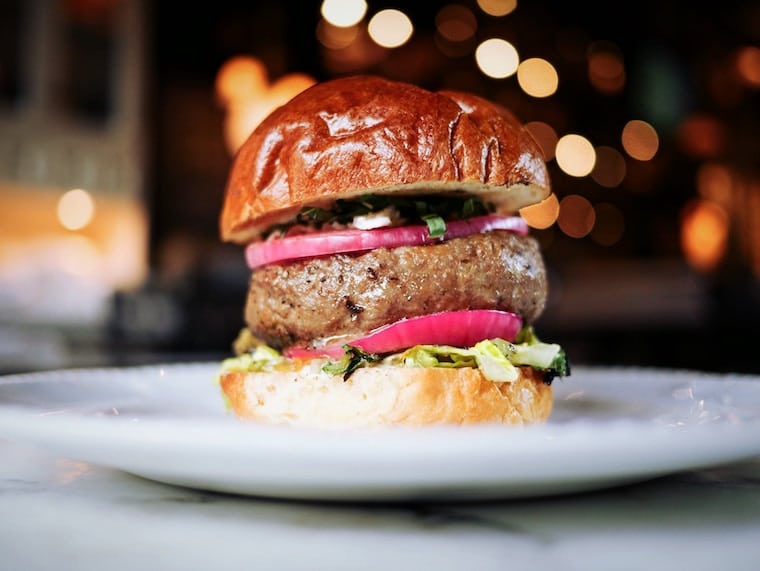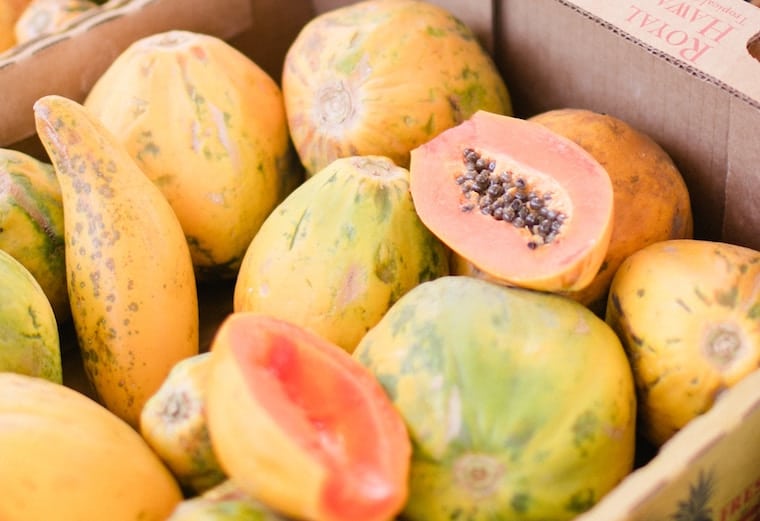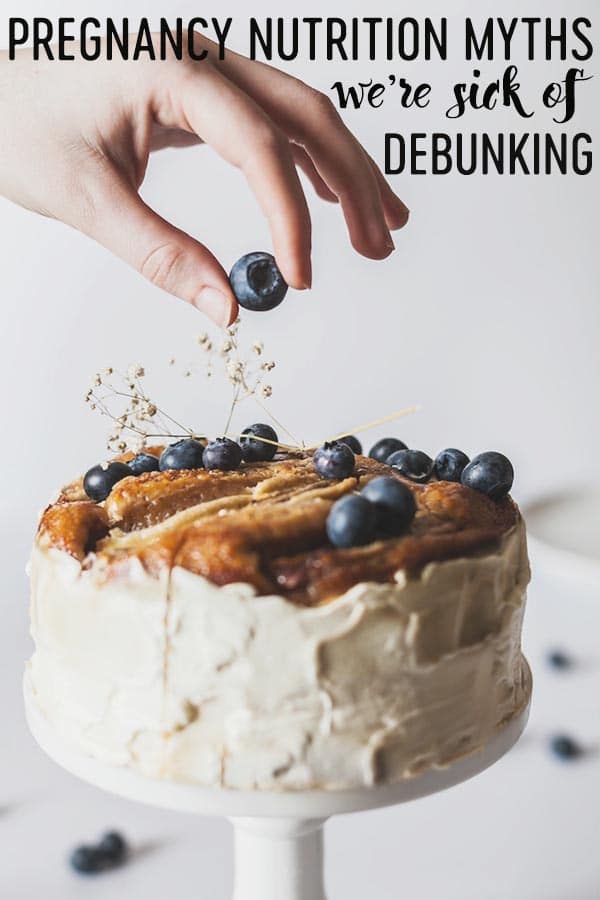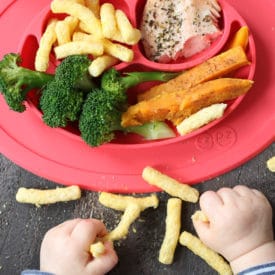Yep. We’re back with more pregnancy nutrition myths that the world keeps on dishing out. If you missed Part 1 we discussed everything from eating for two, to fish, to herbal tea and more! Be sure you don’t miss out on that!! Let’s dive in for more.
More Crazy Pregnancy Nutrition Myths DEBUNKED
Myth #1: You have to eat meat to have a healthy pregnancy

Meat can help provide the B12 and heme iron that mothers-to-be need, but one study found that high intakes of red and processed meats potentially increased the risk for gestational diabetes. Obviously, there are a of lean alternatives that likely would not carry the same risks, but more research is needed in general in this area.
Although meat is often thought of as the most popular source of protein, there are many vegetarian meat alternatives available to choose from. Having a well-planned vegetarian/vegan diet can ensure that you meet your requirements for protein, calcium, iron, and essential fatty acids and, helping you achieve a healthy pregnancy no different than a non-vegetarian. I wrote about all that here. Just keep in mind that getting enough vitamin B12 may require some extra attention so, if you are a vegetarian or vegan, pregnant or not, remember to incorporate B12 fortified foods or supplements and avoid consuming them with vitamin C or copper which reduces its absorption. It may also help if you consult your doctor or a dietitian to assess your specific needs as everyone’s needs may vary.
DON’T: Exclusively eat one food group as it limits you from being able to reap the benefits of other nutrients that are just as important, if not necessary, for a healthy pregnancy and an overall healthy you!
DO: Eat a variety of foods in appropriate amounts to meet nutritional needs before and during pregnancy.
DO: Take time to plan your diet (vegetarian or not) or even put together a list of foods to target specific nutrients as a way to make shopping and cooking more convenient.
DO: Consider non-animal sources of protein (grains, beans, nuts), iron (soy beans, lentils, kale, dried fruits, B12 fortified foods (soy milk, tofu, cereals, nutritional yeast, and sauerkraut in small amounts), and calcium (broccoli, collards, kale, almonds, and soy).
DO: Remember that your body has its own unique needs, so it may be beneficial to consult a professional to determine any nutritional gaps.
Myth #2: Cooling Foods, like papaya and pineapple, will cause miscarriage
At the moment, not a whole lot of research has been done that looks at any particular food item having a direct cause of miscarriage. While I go more into detail on the alleged dangers of foods like papaya and pineapple here, the few studies that are available focus less on specific food and more on dietary pattern. Research has found that a diet low in vegetables, fruit, and dairy potentially increased the risk for miscarriage. However, the lack of quality research in this area makes it difficult to make any sound conclusions from these facts.
DON’T: Worry about one specific food automatically causing a miscarriage.
DON’T: Overdo it on eating large amounts of any specific foods.
DO: Enjoy a variety of foods each day and ensure you’re eating enough calories in general.
Myth #3: Prenatal vitamins are only for women with vitamin deficiencies
Prenatal vitamins aren’t just for women with vitamin deficiencies. In fact, Health Canada recommends women of child bearing age to take multivitamins to ensure a healthy pregnancy. Specifically, they place emphasis on meeting folate and vitamin B12 needs as they play an important role in the development of the fetus. There is a lot of research available that has linked adequate folic acid supplementation (with dietary folate) and decreasing the risks for neural tube defects (NTD). Therefore it is recommended that women of childbearing age take folic acid supplements, in addition to having folate-rich foods, before conception and during pregnancy. However, its worth noting that not all multivitamin are the same. For example, one brand may have a higher iron content than another. So, if you are someone that does not get enough iron through your diet, you may want to consider a multivitamin that can help you meet those needs.
DON’T: Buy any prenatal vitamin that you see on the market without consulting a health professional or reading and understanding the contents in relation to your specific needs.
DON’T: Replace healthy eating with a prenatal vitamin. They exist to work with your diet to help you meet your gestational requirements.
DO: Start taking prenatal vitamins even if you’re not considering getting pregnant. If you’re sexually active and of child bearing age, you never know when you’re going to have an oopsie moment, and you don’t want to get caught without adequate folate intake during those first few weeks of gestation!
DO: Seek a health professional to determine your specific needs and which prenatal vitamin product will work best for you.
DO: Eat a variety of foods to ensure you’re not over or under consuming specific nutrients.
Myth #4: Eating too much sugar can cause gestational diabetes
When we think about diabetes, sugar is the first thing that pops into our mind. However, with the emergence of research over the years, we now know that the cause of diabetes is not that simple. The risk factors for gestational diabetes (GDM) is similar to those of type 2 diabetes: high maternal age, weight, family history, having multiple births, and previous birth of a macrosomic (large) baby. During pregnancy, even healthy women tend to be more insulin resistant in general to promote additional glucose getting to the fetus. Unfortunately, this puts pregnant women at risk for GDM, not the act of eating sugar.
But what about the indirect role of sugar in weight gain and GDM? Well, we know eating too much of anything can cause weight gain, and research has linked obesity to a higher risk of GDM development. That fact, however, is not telling the whole story. It’s often the case that excessive weight gain during pregnancy is the result of a restricting dieting prior to pregnancy, so asking a momma-to-be to diet is putting them at risk of continuing on this dangerous diet rollercoaster. The best thing we can do is to NOT diet or restrict (more on this below).
While sugar per se isn’t the culprit, having a healthy diet in general may help. One study found that a Mediterranean or DASH-style diet helped reduce the risk for GDM, suggesting that a diet rich in fibre-rich fruits, vegetables and whole grains, and lower in red and processed meat may lower the risk. So try to focus on what you’re including in your diet rather than what you’re cutting out.
DON’T: Diet before or during pregnancy, which puts you at risk for weight rebound.
DO: Try to incorporate more fiber-rich foods like veggies, fruits, beans, and whole grains into your diet which can help slow down the sugar spikes, keep you satiated longer and prevent constipation (which is common in pregnancy). Aim to get at least 25 grams each day!
DO: Try to maintain a healthy lifestyle that incorporates moderate exercise to contribute to an overall healthy pregnancy
Myth #5: You should drink less water because you have to pee too much
Water is essential to our health, regardless of whether or not you are pregnant. It plays a role in regulating your body temperature, flushing out toxins and bodily wastes, assisting with the transportation of nutrients and oxygen to cells, as well as acting as a foundation for chemical reactions in the body, to name a few. Your fluid needs during pregnancy actually increase during pregnancy in order to support fetal circulation, amniotic fluid, and the increase in blood volume. As annoying as it is, frequent urination is just one of the pesky side effects of pregnancy, not a reason to cut back. Getting in an adequate fluid supply during pregnancy specifically is key for helping to reduce common issues like constipation, hemorrhoids, bladder infections, preterm labor, swelling and more.
DON’T: Drink less water in spite of peeing less frequently. This would only lead to the possibility of dehydration, which will present its own consequences that are harmful for you and your growing babe.
DO: Drink plenty of fluids, preferably water, to keep yourself hydrated, especially during the summer months and before, during, and after physical activity.
DO: Be mindful of the source of your water to avoid drinking contaminated water.
Myth #6: Always give into cravings, that’s your body telling you what it needs
At one point, it was believed that if your body is craving something, it’s telling you that it needs a specific nutrient found in abundance in that food. However, the emergence of more research has shifted away from this simplistic idea that a food craving = our physiological needs. Cravings are common for everyone and occur for a variety of reasons – while it’s possible they’re physical, they’re also often emotional or psychological, and may be a consequence of food deprivation or restriction from dieting. Not surprisingly, research suggests that giving into high calorie food cravings increases the risk for gestational weight gain. So, should you resist your cravings? I don’t think we need to go that far. I believe that the key is to not make a big deal out of cravings and restriction. Restriction (either before pregnancy, or during) is sure to end in a pregnancy binge, that may just go on for an entire 9 months! By not dieting before pregnancy and getting rid of that good food vs bad food mentality, you can reduce the risk that you’ll feel the need to go hog wild on all of the “forbidden” foods while you cook up your baby. Don’t forget- pregnancy is about feeding your unborn child, so wouldn’t you want to feed it the best? Not to mention, as we discussed in this article– eating veggies and other healthy foods may have a lasting impact on your baby’s palate and diet once it’s born. Just some food for thought!
DON’T: Think you should eat massive portions of your “off limits” foods just because you’re pregnant. There’s no reason not to enjoy your favourite foods (while pregnant, or not!), but try to enjoy more mindful portions each day rather than get into all or nothing thinking.
DON’T: Restrict or diet before pregnancy to help reduce the risk of binding or overeating during pregnancy.
DO: Practice mindful eating and listening to your body to those subtle signs of hunger and satiety.
There you have it ladies. We’ve set the record straight, tossed out the nonsense pregnancy nutrition myths your best friend’s cousin has been spouting and replaced it with the best pregnancy tips for you and your babe. At the end of the day, trust your gut and do what works for YOU and as always if you’re unsure, speak to your go-to health professional.
What major pregnancy nutrition myths have you heard that you want debunked? Leave me a comment below with your thoughts and don’t forget to check out Part 1 for more myths!
Contribution by RD2B: Amy Choi & Rachel Shim
Updated on October 23rd, 2020

Abbey Sharp is a Registered Dietitian (RD), regulated by the Ontario College of Dietitians. She is a mom, YouTuber, Blogger, award winning cookbook author, media coach specializing in food and nutrition influencers, and a frequent contributor to national publications like Healthline and on national broadcast TV shows.










Julie @ Running in a Skirt says
Glad papaya isn’t off the list! Such a yummy fruit. thanks for keeping it real and telling the truth!
Abbey Sharp says
for sure! Thanks Julie
Kelly says
What helpful info. Will be sure to pass it along to my pregnant friends!
Abbey Sharp says
amazing! Thanks kelly
dixya @food, pleasure, and health says
i had no idea that there was a thing about cooling foods, always learning something new.
Abbey Sharp says
yeah, pretty cool!
Elysia | Haute & Healthy Living says
Great article once again Abbey! Love how you’re debunking all of these pregnancy myths. This is exactly the type of information women need!
Abbey Sharp says
Yes! I think so too! Thanks love
Deborah @ Confessions of mother runner says
I had gestational diabetes w one of my pregnancies. Thanks for sharing that info!
Abbey Sharp says
Glad you found it helpful!